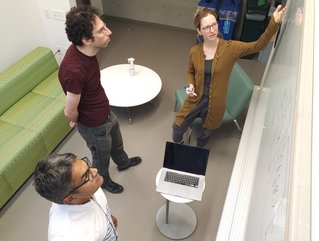Quantum computing 'can ease global supply chain challenges'

The ongoing Russo-Ukrainian conflict and the COVID-19 pandemic have shown how vulnerable global supply chains can be. But new research in quantum computing at Sandia National Laboratories is moving science closer to being able to overcome supply chain challenges and restor global security during future periods of unrest.
Capable of solving problems up to 100 million times faster than traditional computers, quantum computing has the potential to comprehensively speed up processes on a monumental scale.
Alicia Magann, a Truman Fellow at Sandia, has led the development of a new way to design programs on quantum computers, which she and her team think could be especially useful for solving massive optimisation problems at a future point when quantum technology becomes more mature.
“Reconfiguring the supply chain on short notice is an exceptionally difficult optimisation problem, which restricts the agility of global trade,” she commented.
Optimisation algorithms help industries perform tasks like coordinating trucking routes or managing financial assets. These problems are generally difficult to work out, Magann said, and as the number of variables increases, finding good solutions becomes harder.
One of the potential long-term solutions to solving complex optimisation problems is to use quantum computers, an emerging technology that experts believe will be able to find answers to some problems much faster than supercomputers.
But building quantum computing technology is only one of the challenges.
“There’s also this other question of: Here’s a quantum computer — how do I actually program this thing? How do I use it?” Magann said.
Better solutions needed for quantum applications
As explained in a paper by IBM, supply chain and logistics professionals have been stretched thin over the past several years, with an increasing amount of uncertainty – from labour shortages to extreme weather, to pandemic-fueled changes in supply and demand – increasing logistics complexity exponentially.
“The solution to this complexity requires a broader perspective,” IBM says. “Silo-based, function-based, or even enterprise-wide optimizations no longer provide the cure for supply chain and logistics challenges. Instead, businesses need supply chain optimizations that account for the full complexity of the entire ecosystem. They need quantum logistics.”
Researchers around the world are actively developing algorithms for large-scale optimisations on future technologies, with the hope that these programs could help industries manage limited resources more effectively and pivot operations more quickly in the face of rapid changes to the labour market, supplies of raw materials or other logistics.
Mohan Sarovar, the principal investigator on Sandia’s project, said: “It’s very difficult to come up with quantum algorithms. One of the big reasons for this, apart from quantum computing being very unintuitive, is that we have very few general frameworks for developing quantum algorithms.”
Quantum framework to solve supply chain woes
According to their research, the Sandia team succeeded in greatly reducing the role of classical computing. With the new framework, FALQON (Feedback-based Algorithm for Quantum Optimization), the classical computer does not do any optimisation. It only needs the computational power of a calculator, letting the quantum computer do all the heavy lifting and theoretically allowing it to work on much more complicated problems, like how to efficiently reroute a shipping fleet when a major port suddenly closes.
“After I run the first layer of the algorithm, I measure the qubits and get some information from them,” Magann said. “I feed that information back to my algorithm and use that to define the second layer. I then run the second layer, measure the qubits again, feed that information back for the third layer, and so on and so forth.”
Until quantum computers become more powerful, the framework is largely a theoretical tool that can only be tested on problems classical computers can already solve. However, the team at Sandia believes the framework shows great potential for formulating useful algorithms for the medium-to-large-scale quantum computers of the future.






